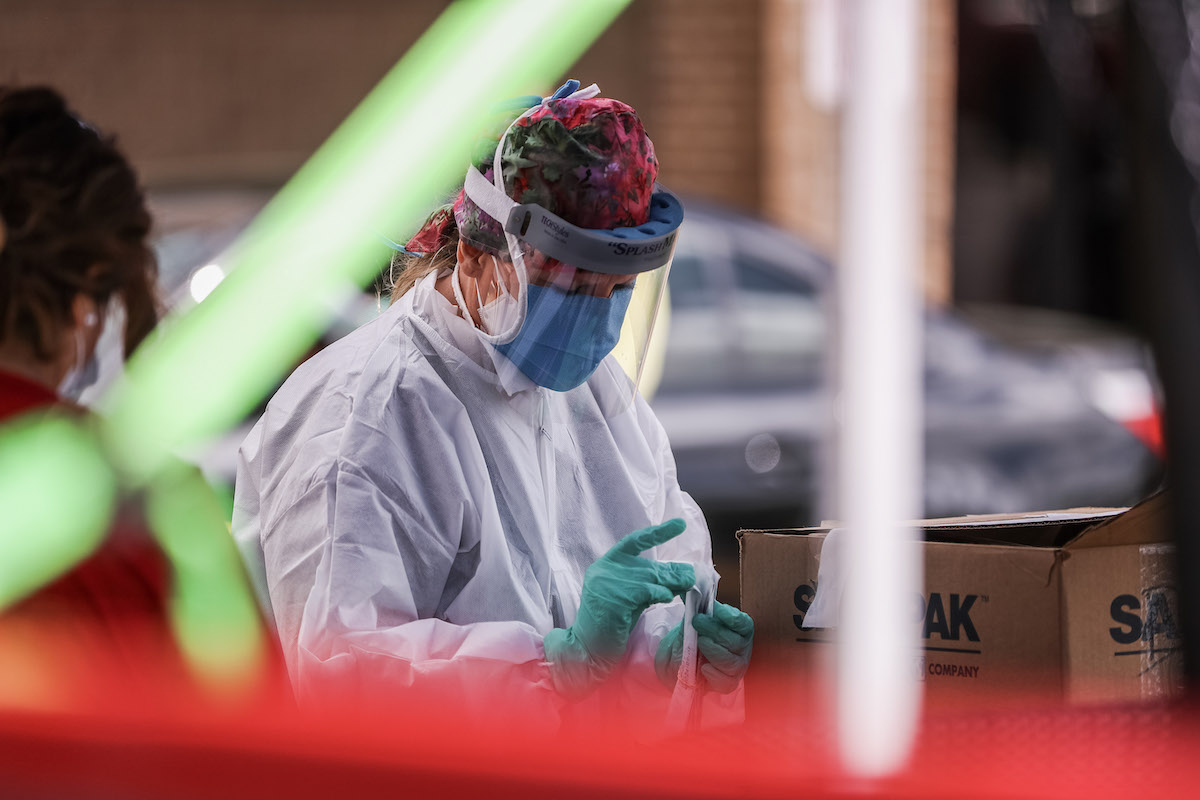
Georgia reported more than 4,500 new COVID-19 infections Tuesday, roughly matching the large increase reported a week ago that was the highest in months.
More than 900 of newly reported cases came from rapid antigen tests, which state officials don’t consider “confirmed’’ cases. The state’s Department of Public Health also said about 1,000 of Tuesday’s cases stemmed from a lag in reporting Monday due to a technical issue.
“Georgia is, however, seeing increased case numbers and COVID-19 transmission that isn’t attributed to processing delays or reporting backlogs,’’ said Nancy Nydam, spokeswoman for Public Health. “It reinforces the need for all Georgians to wear a mask, practice social distancing, wash their hands frequently and follow the guidelines in [Governor Brian Kemp’s] Executive Order and all Public Health recommendations.’’
A Harvard University graphic shows 21 of Georgia’s counties are in a “tipping point’’ status (25 or more cases per 100,000 population), and several of those are in the northwest corner of the state. Another is Chattahoochee County in west Georgia, which includes part of the Army’s Fort Benning and is a constant COVID hot spot.
Dr. Melanie Thompson, an Atlanta physician and a critic of the state’s COVID policies, said Tuesday that Georgia “is in a dangerous position’’ in terms of virus trends.
The Georgia COVID spread comes as the pandemic is worsening across the nation, with the Thanksgiving holidays only a few days away. With colder weather and holiday festivities, experts say, COVID cases may continue to surge.
The latest report from the White House coronavirus task force says that “there is now aggressive, unrelenting, expanding broad community spread across the country, reaching most counties, without evidence of improvement but rather, further deterioration. Current mitigation efforts are inadequate and must be increased to flatten the curve to sustain the health system for both COVID and non-COVID emergencies,” according to CNN.
Some states are halting phased reopening plans or creating new virus-related restrictions. Several are putting limits on social gatherings, adding states to travel quarantine lists, mandating face masks and encouraging residents to stay home, as many did in the spring, USA Today reported. Others are restricting businesses’ hours of operation and tightening rules on how many people can be in restaurants.

Kemp
The newspaper reported that 36 states – plus the District of Columbia and Puerto Rico – now require everyone within their borders to wear face coverings in public, according to a list maintained by AARP. Iowa, Utah and North Dakota joined the list in recent days, and Maine, Ohio and West Virginia strengthened their mandates last week.
Gov. Kemp, while encouraging mask use, has not issued such a mandate for Georgia.
‘A new wave’
The state’s COVID-19 report still lists people who test positive for the coronavirus through PCR tests separately from people who test positive through rapid antigen tests.
But because antigen tests are faster and cheaper, they may be more practical for large numbers of people than PCR tests, experts say. Other Southeastern states report the rapid test results as part of their cumulative infection totals.
Georgia Public Health reported Tuesday that from Nov. 9-16, the seven-day average of new cases reported increased 22.7%. The statewide percent positivity (7-day moving average) for PCR tests increased from 6.9% on Nov. 9 to 8.3% on Nov. 16.
Daily hospitalizations for COVID-19 have increased 10.6% to 1,697 on Nov. 16, but are far lower than the daily high of 3,200 reached July 30.

Thompson
Thompson said Tuesday that Georgia has “a rising curve of people currently hospitalized with COVID-19. Our hospitals, especially in rural areas, will soon be stressed.
“It is time for our governor and our Department of Public Health to follow the lead of other Republican states like North Dakota and Iowa, and call for a mask mandate and additional restrictions on social distancing in this perilous time leading up to Thanksgiving,’’ she said. “We want Georgians to share thanks, not COVID-19.’’
Grady Health System CEO John Haupert told WABE that “we actually in the Atlanta metro and at Grady have begun to see the beginnings of a new wave.”
The steady increase in COVID-19 hospitalizations, Haupert said, has been happening more slowly in Georgia than in most of the country.
But Haupert worries that cooler weather and the coming holiday season will fuel the pandemic, especially if people don’t take the advice of public health experts on how to celebrate safely.
“Everyone wants to hug each other. Everyone wants to be together, but you just can’t do that,” he told WABE. “There is the potential, to me, for Thanksgiving and Christmas to create greater spread if people don’t follow the rules.”







